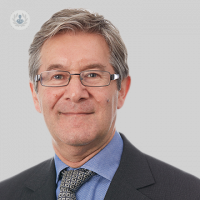Osteoporosis: An expert's guide
Written by:Osteoporosis is a condition that affects the bones, making them weaker and more prone to fractures. In this article, leading consultant in rheumatology and sport and exercise medicine Professor Roger Wolman the symptoms, causes, treatment options, and whether it can be cured, as well as discusses how you can maintain a long and healthy life while managing osteoporosis.

Symptoms of osteoporosis
Osteoporosis often goes unnoticed in its early stages, as it rarely causes symptoms until a fracture occurs. Common signs include:
- Fractures: The hallmark symptom of osteoporosis is a fracture, usually occurring in the hip, spine, or wrist. These fractures can happen from minor trauma or even without any apparent injury.
- Back pain: Compression fractures in the spine may lead to persistent back pain, a common complaint among those with osteoporosis.
- Loss of height: Osteoporosis can cause a gradual loss of height over time as the spine's vertebrae compress.
- Stooped posture: Severe osteoporosis may result in a stooped or hunched posture due to spine curvature.
Causes of osteoporosis
Understanding the causes of osteoporosis is crucial in managing the condition. While it is more common in older adults, several factors contribute to its development, including:
- Age: As we age, our bones naturally lose density and strength, making us more susceptible to osteoporosis.
- Hormonal changes: Reduced oestrogen levels in women during menopause and lower testosterone levels in men can accelerate bone loss.
- Nutrition: Inadequate intake of calcium and vitamin D can weaken bones over time.
- Family History: A family history of osteoporosis increases your risk.
- Lifestyle Factors: Smoking, excessive alcohol consumption, and a sedentary lifestyle can all contribute to bone loss.
Can osteoporosis be cured?
Unfortunately, there is no cure for osteoporosis. However, there are effective treatments to manage and slow down its progression.
Treatment options
- Medications: Various medications are available to strengthen bones and reduce fracture risk. Your healthcare provider will prescribe the most suitable option based on your condition.
- Diet and supplements: A diet rich in calcium and vitamin D, along with supplements if necessary, can help maintain bone health.
- Exercise: Weight-bearing exercises, such as walking and resistance training, can improve bone density and strength.
- Lifestyle Changes: Quitting smoking, moderating alcohol intake, and maintaining a healthy body weight are essential in managing osteoporosis.
Living well with osteoporosis
While osteoporosis cannot be cured, you can lead a long and healthy life by following your treatment plan and making necessary lifestyle changes:
- Regular check-ups: Visit your healthcare provider regularly to monitor your bone health and adjust your treatment plan as needed.
- Fall prevention: Take precautions to prevent falls, as they can lead to fractures. Remove hazards at home, wear appropriate footwear, and use assistive devices if necessary.
- Nutrition: Maintain a balanced diet rich in calcium and vitamin D to support bone health.
- Stay Active: Engage in regular physical activity to keep your bones strong and reduce the risk of fractures.
Professor Roger Wolman is a renowned consultant in rheumatology and sport and exercise medicine. If you would like to book a consultation with Professor Wolman, you can do so today via his Top Doctors profile.


